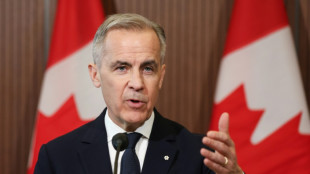-
 Australian schoolboy Gout Gout runs sub-10 second 100m --- twice
Australian schoolboy Gout Gout runs sub-10 second 100m --- twice
-
Scarlett Johansson to star at Cannes as festival unveils line-up

-
 Stock markets soar as Trump delays painful tariffs
Stock markets soar as Trump delays painful tariffs
-
Trump tariffs weigh on Germany as institutes cut forecasts

-
 US and Russia exchange prisoners
US and Russia exchange prisoners
-
Japan top yakuza group promises 'no more trouble'

-
 Champion Martin eyes Qatar return as 'bitter' Marc Marquez seeks redemption
Champion Martin eyes Qatar return as 'bitter' Marc Marquez seeks redemption
-
The US citizens still held in Russian prisons

-
 US-Russian ballet dancer Ksenia Karelina freed by Moscow: Rubio
US-Russian ballet dancer Ksenia Karelina freed by Moscow: Rubio
-
Not just penguins on Antarctic islands hit by Trump tariffs

-
 Canada PM says Trump's pause on tariffs a 'welcome reprieve'
Canada PM says Trump's pause on tariffs a 'welcome reprieve'
-
Witkoff and Araghchi: the men leading US-Iran nuclear talks

-
 Stocks zoom higher as Trump delays painful tariffs
Stocks zoom higher as Trump delays painful tariffs
-
China urges US to meet 'halfway' as markets rocket on Trump tariff pause

-
 Vatican releases image of Charles, Camilla meeting pope
Vatican releases image of Charles, Camilla meeting pope
-
Waratahs' McKellar rules out becoming next Wallabies coach

-
 Taiwan's TSMC says first quarter revenue up 42 percent
Taiwan's TSMC says first quarter revenue up 42 percent
-
Rybakina leads Kazakhstan to BJK Cup victory over Australia

-
 Vietnam says it will start trade talks with United States
Vietnam says it will start trade talks with United States
-
Expo 2025 in Japan: five things to know

-
 Japan's World Expo touts unity, and algae, in turbulent times
Japan's World Expo touts unity, and algae, in turbulent times
-
Trump's tariff pause gives market relief, but China trade war intensifies

-
 Papua New Guinea lifts ban on forest carbon credits
Papua New Guinea lifts ban on forest carbon credits
-
AI surge to double data centre electricity demand by 2030: IEA

-
 Scheffler, McIlroy seek fast start in hunt for history at Masters
Scheffler, McIlroy seek fast start in hunt for history at Masters
-
Samsung under pressure as US tariffs rattle South Korean economy

-
 Munster wary of 'chaotic' Bordeaux-Begles in Champions Cup quarter-final
Munster wary of 'chaotic' Bordeaux-Begles in Champions Cup quarter-final
-
Ranieri eyeing Champions League for Roma before derby swansong

-
 Verstappen out to silence McLaren in the battle of Bahrain
Verstappen out to silence McLaren in the battle of Bahrain
-
Asian stocks crack higher as Trump delays painful tariffs

-
 Cannes to unveil film selection under pressure over industry abuse
Cannes to unveil film selection under pressure over industry abuse
-
Messi scores twice in Miami's frantic comeback over LAFC

-
 Swimmers get medal boost with new events added for 2028 Olympics
Swimmers get medal boost with new events added for 2028 Olympics
-
Companies keen to start deep-sea mining off Norway

-
 US House votes to limit judges' injunction power
US House votes to limit judges' injunction power
-
Pilgrims in Italy flock to tomb of first millennial saint

-
 China consumer prices slump for second straight month: data
China consumer prices slump for second straight month: data
-
Tearful Doncic scores 45 on return to Dallas as Lakers clinch playoff spot

-
 Hamas leadership operating behind veil of secrecy
Hamas leadership operating behind veil of secrecy
-
Trump stuns with tariff backtrack but hikes China rate to 125%

-
 Messi scores twice in Miami's three goal comeback over LAFC
Messi scores twice in Miami's three goal comeback over LAFC
-
Amazon satellite launch scrubbed due to weather

-
 Art of the deal? How Trump backed down on tariffs
Art of the deal? How Trump backed down on tariffs
-
Wellgistics Health, Inc. Announces Agreement to Acquire Peek Healthcare Technologies, Inc., to Support Over 2,500 Patients and $1.5MM Annual Revenue

-
 CureVac Announces Financial Results for the Fourth Quarter and Full-Year 2024 and Provides Business Update
CureVac Announces Financial Results for the Fourth Quarter and Full-Year 2024 and Provides Business Update
-
Interactive Strength Inc. (Nasdaq:TRNR) Updates Investor FAQ In Response to Shareholder Interest in $15M+ Wattbike Acquisition

-
 Nextech3D.ai Signs Letter of Intent to Sell Share Control Block of Toggle3D.ai
Nextech3D.ai Signs Letter of Intent to Sell Share Control Block of Toggle3D.ai
-
U.S. Polo Assn. Celebrates Launch of Field X Fashion, Issue 2, Brand's Award-Winning Global, Digital Magazine Celebrating Sport and Fashion

-
 Moderna to Report First Quarter 2025 Financial Results on Thursday, May 1, 2025
Moderna to Report First Quarter 2025 Financial Results on Thursday, May 1, 2025
-
CMS Chief Dr. Oz's AI Avatar Vision for U.S. Healthcare comes to life through Addison Care

Germany and its outdated pension system
Germany must reform its pension system!
In the midst of an ageing society and changing labour markets, the Federal Republic of Germany is facing one of its greatest socio-political challenges: the urgent need to reform its pension system. Without timely and well-thought-out adjustments, there is a risk of financial bottlenecks and social injustices that could endanger the stability of the social system.
Demographic change as the main driver
Demographic change is indisputably the main factor putting pressure on the German pension system. The birth rate has been low for decades, while life expectancy continues to rise. This trend is leading to an ever-widening imbalance between contributors and pension recipients. According to forecasts, by 2035 almost one in three Germans will be over 65 years old. This ratio calls into question the financial viability of the pay-as-you-go pension system.
Financial sustainability at risk
The growing number of pensioners means higher expenditure for the pension funds, while income from contributions could stagnate or even fall. Without reforms, either contributions would have to be increased significantly or pension benefits cut – both scenarios that could cause social tensions. In addition, the burden on the federal budget is growing, as it already provides significant subsidies for pension insurance.
Changes in the world of work
Digitalisation and globalisation have fundamentally changed the world of work. Permanent full-time jobs are becoming rarer, while part-time jobs, solo self-employment and fixed-term contracts are on the rise. These forms of employment often lead to lower pension entitlements and increase the risk of poverty in old age. The current pension system is not sufficiently prepared for these new realities.
Intergenerational justice
Without adjustments, future generations could face a disproportionate burden. Today's young workers are financing the pensions of today's pensioners, while it is unclear whether they themselves can count on a comparable level of pensions in old age. Reform is therefore also a matter of intergenerational fairness.
Necessary reform approaches
- Increasing the retirement age
A gradual increase in the retirement age, adjusted for rising life expectancy, could relieve the pension funds. Strengthening private and occupational pension provision: Additional pension provision could be encouraged through tax incentives and information campaigns.
- Making retirement more flexible
More individual models could enable employees to retire earlier or later depending on their life situation. Integrating new forms of employment: Adjustments are needed to provide better protection for the self-employed and those in atypical employment.
- Promoting female employment
By making it easier to reconcile family and career, the employment rate can be increased, thereby attracting more contributors.
Conclusion:
Reforming the pension system is no easy task and requires courageous political decisions and a broad social consensus. However, it is indispensable to ensure financial stability and social justice in Germany. Now is the time to act in order to guarantee future generations a reliable and fair pension system.

What are the effects of climate change on sea flora?

Azerbaijan is in control: Armenians flee Nagorno-Karabakh

EU countries agree on watered-down car emissions proposal

Hungary-Dictator PM Orban claims EU 'deceived' Hungary

Ruble at the end: Russia's currency on the brink of collapse

Russia in Ukraine: murder, torture, looting, rape!

That's how terror Russians end up in Ukraine!

Spain: Sánchez's aim of a left coalition will fail!

Russland, der Terror-Staat / Russia, the terrorist state!

Ukraine in the fight against the russian terror State

The Russian criminals will never own Ukraine!



